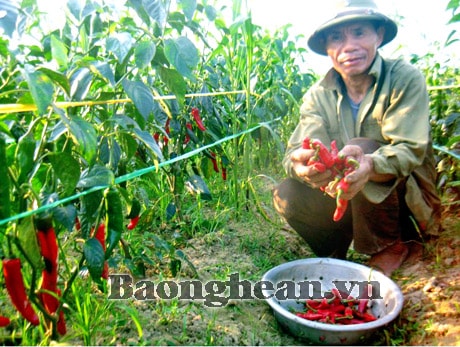No common ground yet
(Baonghean) -Since the Prime Minister's Decision 80/2002/QD-TTg dated June 24, 2002 on the policy to encourage the consumption of agricultural products through contracts was issued, the situation of agricultural product consumption of Nghe An farmers has initially improved. This is considered a breakthrough in increasing farmers' income. The connection between the "4 houses": the State, scientists, businesses and farmers is closer. However, for short-term agricultural products, the results have not been as expected.
Nghe An Agricultural Materials Corporation signs contracts with farmers to consume agricultural products such as rice, corn, and peanuts in Nghe An. In the chain linking 4 houses, the Company takes on 2 houses: "scientists" and "businessmen". Participating in the contract, the company supplies seeds, fertilizers, guides science and technology and ensures the consumption of 100% of products for farmers. In 2011, the company signed contracts with farmers to produce over 600 hectares of rice concentrated in the districts of Nam Dan, Hung Nguyen, Nghi Loc, Dien Chau, Quynh Luu, and Yen Thanh.

Farmers are still not familiar with the production and trading method as a bridge between farmers and businesses. (In the photo: growing chili for export in An Hoa commune - Quynh Luu)
In many other localities such as Nam Dan, Quynh Luu, Dien Chau, many enterprises inside and outside the province have signed many contracts with farmers. For example, the peanut growing model under the Agricultural Competitiveness Project in Dien Thinh Commune (Dien Chau), the sweet pepper growing model for export in An Hoa Commune (Quynh Luu), the hot pepper growing model in Nam Cuong Commune (Nam Dan), corn growing models in Thanh Chuong, Anh Son... In these localities, the efficiency in productivity and quality of agricultural products has been confirmed. Farmers are trained in scientific and technological advances in production and from here, their income is increased. For farmers, this is the solution for the output of agricultural products with stable prices and support when facing difficulties.
However, the effectiveness of the "4 houses" linkage when implementing short-term agricultural contracts is not high. The most obvious reason is that farmers are not yet familiar with the production and trading method as a bridge between farmers and enterprises, there is no large-scale concentrated raw material area associated with processing factories. Lack of support and incentive policies for cooperatives to participate in organizing agricultural product consumption services for members... leading to a small number of goods consumed through contracts. Many consumption contracts do not clearly show the role and responsibility of each house. Of the 4 houses, most of them are only 2 houses: "business house" and "farmer house".
According to the representative of Nghe An Agricultural Materials Corporation, most cooperatives do not understand economic contracts and do not see the long-term benefits of commodity consumption contracts. Therefore, farmers are willing to sell their products to traders, not to businesses when the outside price is higher. In Hung Tay commune (Hung Nguyen), in the spring of 2011, more than 70 households signed a contract with Nghe An Agricultural Materials Corporation to produce Nghi Huong 2308 rice variety on an area of 20 hectares. According to calculations, the amount of goods that the company can purchase is about 120 tons. However, after harvesting, farmers did not sell to the company but sold to outside traders.
However, according to Mr. Le Dinh Ty, Vice Chairman of the Commune People's Committee, in the commitment, the company will purchase goods at the market price at that time and add 20%. However, at that time, in the Gia market area (Hung Tay), the price of Nghi Huong rice was 8,000 VND/kg but the company only bought at 7,600 VND/kg (plus 20%). Because the purchase price was lower than the market price, farmers did not sell rice to the company.
The reason for the price difference is an obstacle in the process of linking businesses and farmers. In fact, not all businesses sign contracts with preferential prices for farmers. When it comes to harvest, the market price of agricultural products is higher than the price that businesses have signed to buy, so many farmers secretly sell to other agents or traders. If the output is large, the difference in value is also large. Farmers wonder: why set a floor price when the price of agricultural products in the market is always fluctuating? However, they do not understand the stability and longevity of entering into a contract.
Pham Bang






